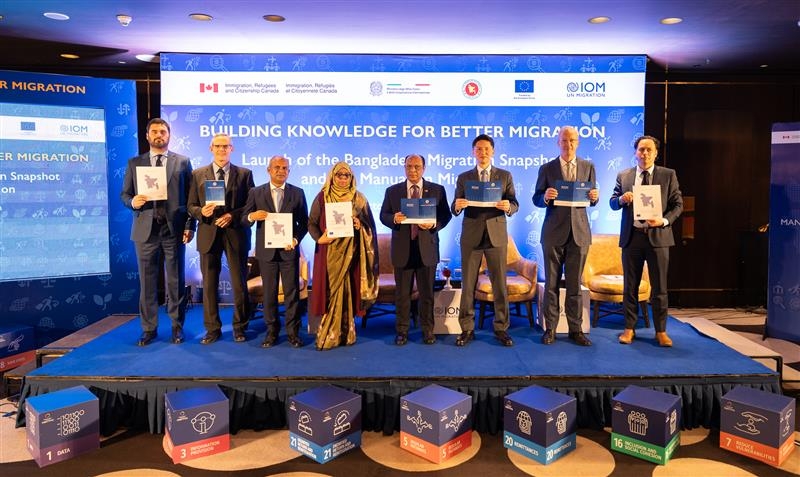- Passenger bus in northern India catches fire: 20 people burn to death |
- Voting start in Ctg Varsity Central Students Union elections |
- Death toll in Mirpur factory, chemical godown fire rises to 16 |
- Humanitarians Urge Donors as Global Aid Remains Severely Short |
- Sami’s five-for 33 seals Afghanistan’s 200-run rout of Bangladesh |
IOM, BD unveil migration manual for data-driven governance

IOM, Bangladesh unveil migration manual to strengthen data-driven governance
Dhaka, Oct 14 — The government of Bangladesh and the International Organization for Migration (IOM) on Tuesday launched the Manual on Migration and the Bangladesh Migration Snapshot Report to strengthen migration governance and promote data-driven policymaking.
The launch event, titled “Building Knowledge for Better Migration”, was held in Dhaka with the support of the European Union, Immigration, Refugees and Citizenship Canada (IRCC), and Italy’s Ministry of Foreign Affairs and International Cooperation (MAECI).
The Manual on Migration, developed under the guidance of the government, is a first-of-its-kind resource containing 15 modules on migration concepts, global and national frameworks — including the Global Compact for Safe, Orderly and Regular Migration and the SDGs — as well as cross-cutting themes such as gender, protection, and human rights.
It is designed as a reference and training tool for policymakers, researchers, and development partners.
The Bangladesh Migration Snapshot Report consolidates data from multiple sources to present an overview of migration trends, policy developments, and recommendations.
It aims to help identify emerging trends and guide evidence-based policymaking for safe and well-managed migration.
Bangladesh, one of the world’s top countries of origin for migrant workers, received USD 27 billion in remittances in 2024, with migration continuing to play a crucial role in the national economy and social development.
The publications were launched by IOM Regional Director Iori Kato and Chief Guest Dr. Neyamat Ullah Bhuiyan, Senior Secretary of the Ministry of Expatriates’ Welfare and Overseas Employment.
Also present were Special Guests Aleya Akter, Secretary of the Statistics and Informatics Division; ATM Abdur Rouf Mondol, Director General of the Consular and Welfare Wing at the Ministry of Foreign Affairs; and Michal Krejza, Head of Development Cooperation at the EU Delegation to Bangladesh.
Senior government officials, UN representatives, development partners, and migration experts attended the event and reaffirmed their commitment to enhancing migration data systems, institutional collaboration, and knowledge sharing for safer migration governance. - UNB

